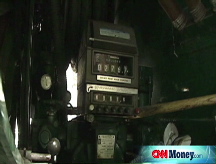Oil dips below $70 a barrel
Concern about falling demand sends investors scurrying from expiring contract ahead of this week's inventory report.
NEW YORK (CNNMoney.com) -- Oil prices fell Tuesday, briefly sliding below the $70-a-barrel mark, as talk of falling demand continues to weigh on the markets.
U.S. crude for November delivery settled down $3.36 to $70.89 a barrel in New York. During the session, the contract touched a low of $69.77.
It was the expiration day for the November contract, often a signal for volatile trading. The December contract, which becomes active Wednesday, settled down $2.09 to $72.18.
Traders awaited the Energy Department's weekly inventory report, due Wednesday, that was expected to show a buildup in crude and gasoline stocks, according to analysts polled by energy research firm Platts. Part of the reason for the expected inventory increase is the decline in demand, induced in part by the high prices of the past summer and the weakened economy.
"We're going to go from 2 cars in the garage to 1 car and a bus pass," said James Cordier, founder of online commodities brokerage OptionSellers.com in Florida.
Oil prices have fallen more than 50% from a record high of $147.27 a barrel in mid-July as investors have worried about falling demand for petroleum-based fuel due to both cost and the slowdown in the global economy.
In the United States, the world's largest oil consumer, gas prices hit a high of $4.114 a gallon in July on average, though they have since fallen below $2.90 at the pump, according to motorist group AAA.
"No one sees anything on the horizon economically that's going to turn it around," said Tony Lerner, broker with energy brokerage GA Global Markets in New York.
OPEC cut: The Organization of Petroleum Exporting Countries plans to announce a production cut at an emergency meeting Friday, in order to stem a three-month slide in crude prices, according to the oil cartel's president Chakib Khelil, as reported by Algerian news media. Khelil is also the oil minister of Algeria.
According to Khelil, the global oil market is oversupplied by about 2 million barrels a day.
Investors expect to see OPEC cut production by at least 1 million barrels a day, but analysts said the planned cut may not be enough to impact oil markets.
"A million barrels a day is nothing," said Lerner. "It doesn't even do enough to make up for demand."
"Demand in the past 60 to 90 days has (already) dropped by over 1 million barrels a day," said Cordier.
Even if OPEC does cut production, there's no guarantee its member nations will comply with the quota. "I don't believe for a minute that a majority of the countries are going to adhere to that," and neither does the market, said Cordier, since the economies of many OPEC nations, with the exception of Saudi Arabia, depend heavily on crude sales.
The organization has been worried that high oil prices this year, along with global economic problems, may permanently impact demand for crude.
Dollar: Meanwhile, oil prices fell as the U.S. dollar continued to gain traction against other major currencies due to the economic crisis.
The dollar, which is often considered a stable investment during times of economic crisis, continued to climb versus the 15-nation euro.
Since oil is traded in dollars, strength in the dollar can drive down crude prices. ![]()




